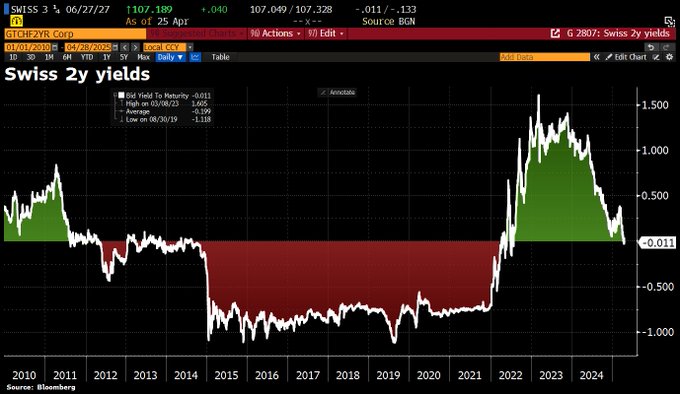Caixin previously warned that a rapid decline in the US dollar would not be a good thing for the world. Now, the traditional European "safe haven," Switzerland, is perhaps the first to feel this deeply.
The Swiss franc surged to its highest level in a decade against the US dollar last week, as investors sought refuge from the turmoil of the trade war initiated by Trump. This has sparked market speculation that the Swiss National Bank (SNB) will be forced to cut interest rates back to zero or even negative to curb the appreciation of the franc.
Notably, after the Bank of Japan raised interest rates last year, the benchmark rates of all major economies are now above zero. If Switzerland returns to zero or negative rates, it would undoubtedly mean that Trump's trade war and the subsequent wave of dollar depreciation will completely shatter the global interest rate "floor."
Market data shows that the USD/CHF exchange rate approached the 0.8 level last week for the first time since the 2015 Swiss franc shock. This has put Swiss policymakers in a dilemma: they need to suppress the currency to support the country's export-driven economy while avoiding drawing attention from the US, which has threatened Switzerland with high tariffs.

Note: USD/CHF performance over the past two months
Kit Juckes, head of FX strategy at Société Générale, pointed out that this situation has put the SNB in a "shockingly difficult position." He added that the Swiss government does not want to face significant deflationary pressures again, leaving them feeling particularly frustrated.
As traders bet on the SNB cutting rates, Swiss short-term government bond yields have recently fallen back into negative territory for the first time in over two and a half years. The two-year Swiss government bond yield, which reflects interest rate expectations, closed slightly below zero last Friday...

Many analysts warn that the rapid appreciation of the franc could lead to deflationary pressures in Switzerland, and the impact of Trump's trade war on economic growth will exacerbate this risk. Before the White House announced a 90-day suspension of reciprocal tariffs earlier this month, the reciprocal tariff rate on Swiss goods had reached as high as 31%, exceeding the level imposed on the EU. Over 10% of Swiss exports rely on US consumers.
Intervention Difficult, Only Rate Cuts Left?
In fact, Switzerland, with its rich experience in curbing currency appreciation, is no stranger to sharp exchange rate fluctuations.
The current trouble is that if Swiss authorities directly intervene in the foreign exchange market, it could draw the attention of the Trump administration. Some analysts suggest that Swiss authorities are concerned that large-scale intervention to suppress the franc's rise could once again lead to the US labeling Switzerland as a "currency manipulator."
Switzerland was included in the US "currency manipulator" list towards the end of Trump's first term (partly due to its foreign exchange interventions to buffer the pandemic impact) and was only removed during the Biden administration.
Gregor Kapferer, head of bonds at Swiss private bank Vontobel, stated that the SNB "will certainly be concerned" and believes that increasing intervention would be a "last resort." He noted that while Switzerland was accused of currency manipulation during the previous Trump administration, it faced no substantial sanctions. However, with Trump potentially taking concrete actions now, the SNB will undoubtedly be more cautious.
Francesco Pesole, FX strategist at ING, believes that "if the SNB is unhappy with the strong franc and constrained by foreign exchange intervention limits, then rate cuts may be the only option."
From the perspective of the foreign exchange market, the recent rise in the franc against the euro has made this export-dependent country's relationship with its largest trading partner even more challenging.
In Q1 this year, the SNB was the first among major global central banks to cut its benchmark rate to 0.25%, and many market participants believe further rate cuts are a safer policy option to curb the franc's appreciation. The SNB previously maintained negative rates for eight years to suppress excessive franc appreciation, only returning to positive territory in 2022 to address post-pandemic inflation spikes.
Swap market data shows that while expectations for the SNB cutting rates into negative territory by year-end remain low, current market pricing reflects an approximately 80% probability of a rate cut to zero at the June meeting. Switzerland's current annual inflation rate of 0.3% is already near the lower limit of the central bank's 0-2% target range.
Stefan Gerlach, chief economist at Swiss private bank EFG, stated that negative rates are "very likely to happen," and currency intervention may ultimately be necessary.
However, Gerlach downplayed the likelihood of Switzerland being labeled a currency manipulator again. He believes that "rational decision-makers" in the US Treasury should agree that such interventions do not constitute a problem, as "deliberately devaluing a currency for competitive advantage would be controversial, but moderate regulation of a surging currency would not."